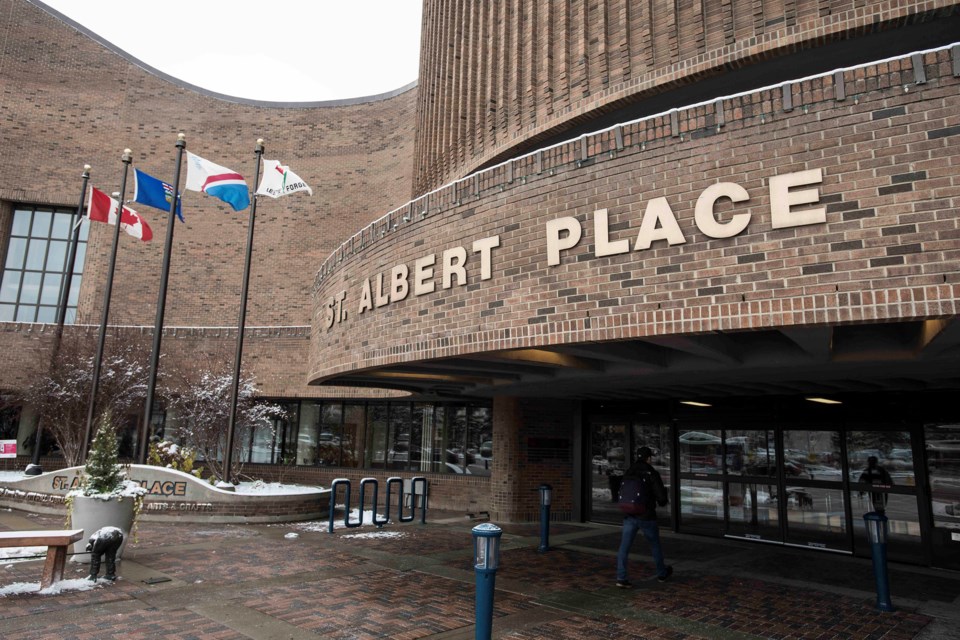This year, St. Albert city council’s annual two-day strategic planning session comes with a heftier price tag due to the recent election.
The session will take place March 15-16 at Métis Crossing in Smoky Lake. Council typically tackles strategic planning in January, but experienced delays due to COVID-19. Because a new council was elected last fall, the City will bring in an external facilitator for the session, which in total will cost around $25,000. In previous years, sessions run by City administration have cost around $4,000.
In 2017, the council of the day voted to hire an external facilitator to run the first strategic planning session at the start of each council’s new term. This year’s $25,000 cost includes preparation for the session, facilitation, and creation of the plan itself, City spokesperson Cory Sinclair said in an email.
Sinclair said internal resources will be used to develop the corporate business plan, which outlines action items to realize the goals in council’s strategic plan.
Council decided to bring in an external facilitator in 2017 after hearing recommendations from a municipal inspection report.
In the report, inspector George Cuff criticized council’s past strategic planning process, arguing that having City staff facilitate the session led to policies that didn’t reflect council’s priorities.
On Thursday, Coun. Natalie Joly said she has appreciated having an external facilitator to aid with strategic planning both as a councillor in 2017, and through her role on the board of affordable housing not-for-profit Homeland Housing.
“It really helps council focus on governance rather than getting into the weeds,” Joly said. “Having that external lens is incredibly valuable.”
Joly said she is looking to go into this first session with the new council “open minded.”
“I'm looking to hear from my council colleagues about what they would like to accomplish in the next four years and what they would like to build on,” Joly said, noting she will also be looking to get an idea of what is reasonable for council to accomplish in their term.
Mayor Cathy Heron was not available for an interview, but mentioned in an earlier unrelated interview on Feb. 28 that she will be bringing each council member's campaign brochures.
"We throw ideas at the wall and see what sticks," Heron said.
Coun. Ken MacKay said the session will be “critical,” especially as council looks to address the economic impact of COVID-19 from the past two years.
“The importance of [strategic planning] is so vital because it really drives the next four years … how does administration translate the strategic priorities into actionable items going forward?” MacKay said.
MacKay echoed Joly in highlighting the importance of bringing in an external facilitator for the first planning session of the term.
“As we start at the beginning, it helps to have some outside eyes,” MacKay said, noting in subsequent years council only used City administration for the sessions.
When asked why council will go the distance up to Métis Crossing instead of remaining in St. Albert, MacKay said there is value in bringing council to one location which speaks to strong ties with St. Albert’s heritage and culture.
“This is a very unique, cultural interpretive centre that’s just starting to get up and running, and it’s something that I look forward to learning more about,” MacKay said.
When asked about her thoughts on going to Métis Crossing for the session, Coun. Shelley Biermanski — who is serving her first term as a councillor — said she personally doesn’t feel there is a reason to travel outside of St. Albert.
“I don’t understand the point … but everyone has their own opinion,” Biermanski said, noting that other councillors have said a change of setting is useful.
Councillors still have the option to attend the sessions virtually, as with regular council meetings.
Biermanski said she is “quite interested” in what the sessions will look like, adding that she is expecting council to come out of the retreat with a “solid plan for the future."
Sessions happen behind closed doors
As with strategic planning sessions in the past, the session will be held behind closed doors. Official reasons for holding the meeting in private, according to an agenda for the strategic planning session, is to seek advice from officials, an action protected under Alberta's Freedom of Information and Protection of Privacy (FOIP) Act.
Joly said meeting in camera affords council a safe space to disagree.
“It sets the stage for those robust or frank discussions and disagreements, while allowing us to come out at the end with a unified voice as we present our plan,” Joly said.
Council's strategic plan will be presented at a public council meeting by the end of May, Sinclair said in the email, after it is drafted, reviewed, and finalized by council.




